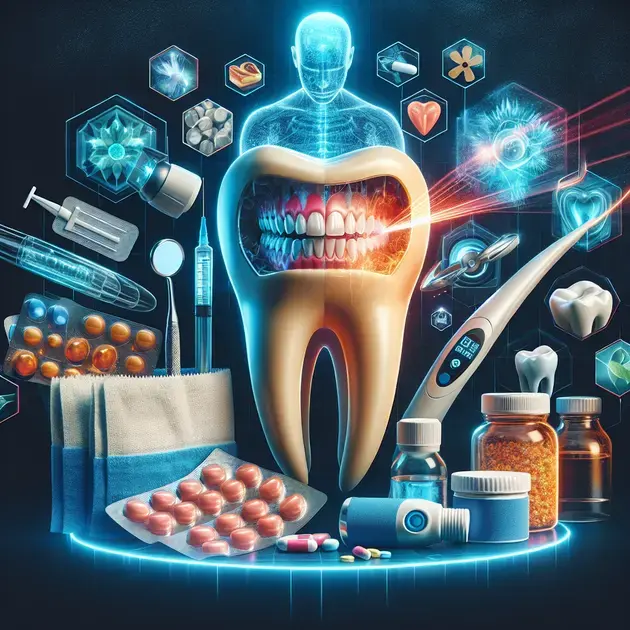When it comes to combating periodontitis, also known as gum disease, finding an effective medication is crucial for successful treatment. In this comprehensive guide, we will explore the best strategies for managing this common oral health condition.
Recent studies have shown promising results in the use of certain medications to treat periodontitis, offering new hope for those suffering from gum disease. Understanding the options available and how to use them effectively is key to achieving positive outcomes in periodontal care.

Understanding Periodontitis Treatment Medications
Periodontitis is a serious gum infection that can damage the soft tissue and destroy the bone that supports your teeth. When it comes to treatment, medications play a crucial role in managing the condition effectively. Understanding the different types of medications available for periodontitis is essential for patients looking to improve their oral health.
One promising medication option for periodontitis treatment is Chlorhexidine mouthwash. This antimicrobial rinse helps reduce plaque and gingivitis, contributing to overall gum health. You can easily find Chlorhexidine mouthwash at your local pharmacy or order it online from websites like Amazon or Walmart.
Another medication option to consider is Doxycycline gel. This antibiotic gel is placed directly into the periodontal pockets to combat the bacteria causing the infection. Your dentist or periodontist can prescribe Doxycycline gel, and it can be administered during a routine dental visit.
For more severe cases of periodontitis, systemic antibiotics like Amoxicillin or Metronidazole may be recommended. These medications are taken orally to target the bacteria throughout the body. Your healthcare provider will determine the appropriate dosage and duration for optimal results.
In addition to medications, maintaining good oral hygiene practices such as daily brushing, flossing, and regular dental check-ups is vital for managing periodontitis effectively. Combining medications with proper oral care can help control the infection and prevent further complications.
Exploring Promising Medication Options
When exploring medication options for periodontitis treatment, it’s essential to consider the potential benefits and side effects of each medication. Your healthcare provider will recommend the most suitable medication based on the severity of your condition and your overall health.
One promising medication option to explore is Arestin. This antibiotic powder is placed directly into the periodontal pockets during a dental visit. Arestin helps eliminate the bacteria causing the infection and promotes healing of the gum tissue. Your dentist can provide more information about this treatment option.
Another medication worth exploring is PerioChip. This small chip contains Chlorhexidine, an antimicrobial agent that helps reduce bacteria in the periodontal pockets. PerioChip is inserted by your dentist during a simple procedure and gradually releases the medication over time for enhanced effectiveness.
For individuals looking for natural medication options, herbal mouth rinses like tea tree oil or sage can also offer benefits in managing periodontitis. These natural remedies have antimicrobial properties that can help reduce inflammation and support gum health. You can purchase herbal mouth rinses from health food stores or online retailers.
Ultimately, exploring different medication options with your healthcare provider and understanding how each treatment works can help you make informed decisions about managing your periodontitis effectively.
Effective Strategies for Managing Gum Disease
Gum disease, including periodontitis, requires a comprehensive approach to treatment and management. In addition to medications, implementing effective strategies for managing gum disease is crucial for maintaining oral health and preventing complications.
One effective strategy for managing gum disease is to adopt a thorough oral hygiene routine. This includes brushing your teeth twice a day, flossing daily, and using an antimicrobial mouthwash to help reduce plaque and bacteria in the mouth. Apps like Brush DJ can be helpful in setting reminders for proper oral care habits.
Regular visits to your dentist for professional cleanings and check-ups are also essential for managing gum disease effectively. Your dentist can assess the health of your gums, provide treatment as needed, and offer guidance on how to improve your oral hygiene practices.
Incorporating a balanced diet rich in fruits, vegetables, and lean proteins can also support gum health and overall well-being. Foods high in sugar and carbohydrates can contribute to bacterial growth in the mouth, leading to gum disease. Apps like MyFitnessPal can assist in tracking your dietary choices and promoting healthier eating habits.
Additionally, managing stress levels through relaxation techniques, exercise, and adequate sleep can help reduce inflammation in the body and support gum health. Apps like Headspace or Calm can provide guided meditation sessions and stress-relieving exercises to improve your overall well-being.

Understanding Periodontitis Treatment Medications
Periodontitis is a serious gum infection that damages the soft tissue and destroys the bone that supports your teeth. When it comes to treating periodontitis, medications can play a crucial role in managing the condition. Understanding the different types of medications available can help you make informed decisions about your treatment plan.
Types of Periodontitis Treatment Medications
There are several types of medications that may be used to treat periodontitis, including antibiotics, antimicrobial mouth rinses, and enzyme suppressants. Antibiotics are commonly prescribed to kill the bacteria causing the infection, while antimicrobial mouth rinses can help reduce plaque and prevent further infection. Enzyme suppressants work by blocking specific enzymes that contribute to the breakdown of gum tissue.
Benefits of Periodontitis Treatment Medications
Using medications as part of your periodontitis treatment plan can offer several benefits. These medications can help control the bacterial infection, reduce inflammation, and prevent the progression of gum disease. By following your dentist’s recommendations and taking medications as prescribed, you can improve the health of your gums and prevent further damage to your teeth and supporting structures.
Potential Side Effects
While medications can be effective in treating periodontitis, they may also have potential side effects. Common side effects of periodontitis treatment medications may include gastrointestinal issues, oral thrush, and allergic reactions. It’s important to discuss any concerns or side effects with your dentist or healthcare provider to ensure the proper management of your condition.
Effectiveness of Medications
The effectiveness of periodontitis treatment medications can vary depending on the individual and the severity of the condition. Some patients may respond well to medication alone, while others may require additional treatments such as scaling and root planing or surgery. It’s essential to work closely with your dental professional to monitor your progress and adjust your treatment plan as needed.
Exploring Promising Medication Options
When it comes to managing periodontitis, exploring promising medication options can provide new insights into effective treatment strategies. With advancements in dental research and technology, there are continually evolving options for medication that can help improve gum health and prevent further damage.
New Developments in Periodontitis Medications
Researchers are constantly exploring new developments in periodontitis medications to enhance treatment outcomes. From targeted antibiotic therapies to innovative enzyme inhibitors, these emerging options show promise in effectively combating gum disease and promoting long-term oral health.
Personalized Medication Approaches
Personalized medication approaches are gaining traction in periodontitis treatment, as they allow for tailored therapies based on individual patient needs. By analyzing genetic factors, bacterial profiles, and immune responses, healthcare providers can customize medication regimens to maximize effectiveness and minimize side effects.
Combination Therapy Strategies
Combination therapy strategies that incorporate multiple medications can offer a comprehensive approach to treating periodontitis. By combining antibiotics, antimicrobial agents, and anti-inflammatory drugs, dentists can address the various aspects of gum disease and support healing and regeneration of gum tissue.
Patient-Centered Care
With a focus on patient-centered care, exploring promising medication options involves engaging individuals in their treatment plans and prioritizing their oral health goals. By fostering open communication and collaboration between patients and healthcare providers, successful outcomes can be achieved in managing periodontitis with innovative medications.
Effective Strategies for Managing Gum Disease
Gum disease, including periodontitis, requires comprehensive management strategies to promote optimal oral health and prevent disease progression. By incorporating effective strategies into your daily routine and working closely with your dental professional, you can take control of your gum health and maintain a healthy smile.
Maintaining Good Oral Hygiene
One of the fundamental strategies for managing gum disease is maintaining good oral hygiene practices. This includes brushing your teeth twice a day, flossing regularly, and using an antimicrobial mouthwash to reduce bacteria that contribute to gum disease. Regular dental cleanings and check-ups are also essential for monitoring your gum health.
Healthy Lifestyle Habits
Adopting healthy lifestyle habits, such as eating a balanced diet, avoiding tobacco products, and managing stress, can positively impact your gum health. Nutrient-rich foods promote overall oral health, while avoiding smoking and excessive stress can reduce inflammation and support the body’s ability to fight off gum disease.
Consistent Follow-Up Care
Consistent follow-up care with your dental professional is crucial for managing gum disease effectively. Regular dental visits allow your dentist to monitor the progression of gum disease, provide professional cleanings, and adjust your treatment plan as needed. By staying proactive in your oral health care, you can prevent complications and maintain healthy gums.
Educational Resources
Utilizing educational resources and support services can empower you to take an active role in managing your gum disease. From online information to educational materials provided by your dental office, staying informed about gum disease and treatment options can help you make informed decisions and pursue optimal oral health outcomes.
Conclusion
Understanding periodontitis treatment medications is crucial for managing this serious gum infection effectively. By utilizing different types of medications such as antibiotics, antimicrobial mouth rinses, and enzyme suppressants, individuals can control bacterial infections, reduce inflammation, and prevent the progression of gum disease. It’s important to be aware of the potential side effects these medications may have, including gastrointestinal issues, oral thrush, and allergic reactions, and to communicate any concerns with healthcare providers for proper management.
Exploring promising medication options, including new developments in periodontitis medications, personalized medication approaches, and combination therapy strategies, can provide innovative solutions for combating gum disease and promoting long-term oral health. Researchers are constantly working on advancements in medication to enhance treatment outcomes and provide tailored therapies based on individual patient needs. By engaging in patient-centered care and collaborating with healthcare providers, individuals can achieve successful outcomes in managing periodontitis with the help of these medications.
Effective strategies for managing gum disease, such as maintaining good oral hygiene, adopting healthy lifestyle habits, consistent follow-up care, and utilizing educational resources, are essential for promoting optimal oral health and preventing disease progression. By incorporating these strategies into daily routines and working closely with dental professionals, individuals can take control of their gum health, maintain healthy gums, and achieve a confident smile for years to come.



